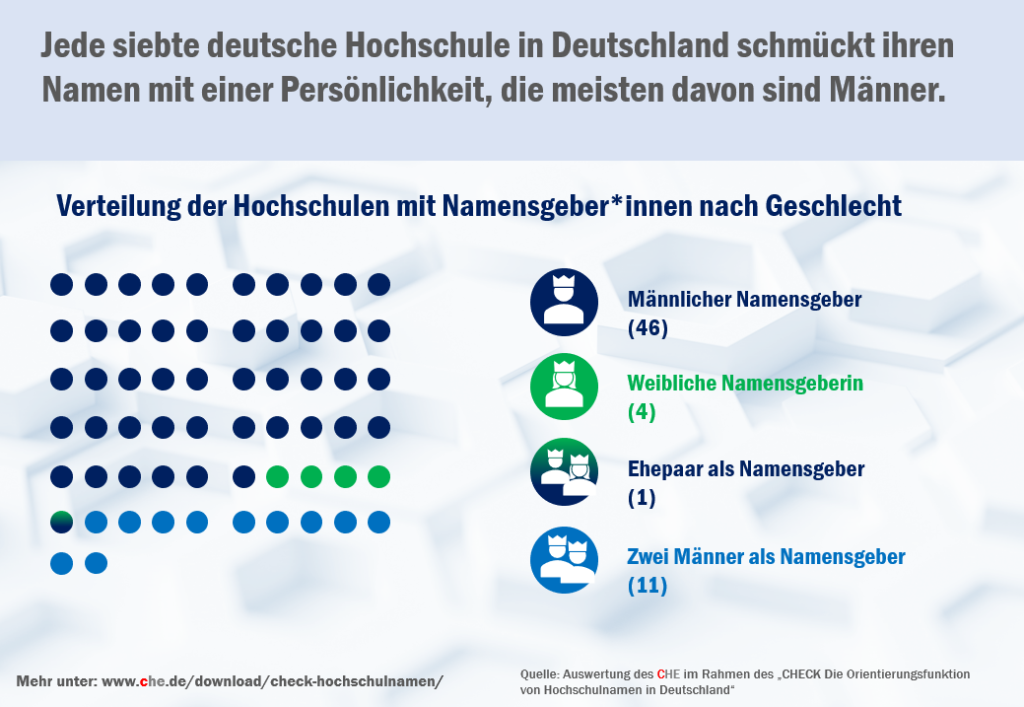 Eine Universität ohne "Universität" im Namen - die RWTH Aachen | Foto: Tofterigen auf Pixabay
Eine Universität ohne "Universität" im Namen - die RWTH Aachen | Foto: Tofterigen auf PixabayProspective students can currently choose from more than 21,000 study programmes at over 400 higher education institutions (HEIs) in Germany. The names of the HEIs in question often offer little in the way of filtering and orientation in the decision-making process, given their lack of explanatory power in some cases. Many HEIs do not include key attributes such as the type of university or its location in their title. These are the findings of an analysis conducted by the CHE Centre for Higher Education.
In the early 2000s, Fachhochschulen (≈polytechnics) in Germany were granted the right to call themselves Hochschulen für angewandte Wissenschaften (universities of applied sciences), or HAW (UAS) for short. In 2022, more than a quarter (28%) of all universities of applied sciences used the new term – either in German or English – in their primary name, while 14% continued to use the term Fachhochschule. This is the conclusion reached by a CHECK on the orientation function of university names in Germany carried out by the CHE Centre for Higher Education.
Not all universities and other institutions of equivalent status to universities use the term “university” in their name to express the type of HEI they are and their special status, such as the right to confer doctorates and the post-doctoral lecturing qualification Habilitation. For example, RWTH Aachen, the Hertie School and Karlsruhe Institute of Technology are among the 28 per cent of HEIs with university status that do not explicitly refer to this fact in their names.
“In many cases, prospective students are unable to tell from the name of the university what type of HEI it is and the kind of subjects it offers,” summarised the author of the study, Ulrich Müller. Even so, 71 per cent of HEIs mention the name of a place in their title to provide orientation, while 18 per cent refer to a geographical feature such as a water body, mountain range or place of interest.
Around one in seven HEIs in Germany refer to a prominent person in their name. There are currently four all-female namesakes, as well as one HEI that refers to a founding couple. Fifteen per cent of German HEIs have an English word as part of their name; other university names refer to abbreviations, acronyms or even a postcode. The HEI with the longest official name is the Fachhochschule für öffentliche Verwaltung, Polizei und Rechtspflege des Landes Mecklenburg-Vorpommern (University of Applied Sciences for Public Administration, Police and Administration of Justice of the Federal State of Mecklenburg-West Pomerania). Those with the least characters are hochschule 21 and the Hertie School.

“Given the sheer number of options, university names should provide clarity for prospective students and – with all due respect for creative marketing and unique selling propositions – avoid causing even more confusion in the process of choosing a university,” commented Ulrich Müller. “As with any product or service, the name of a higher education institution should also give a clear indication of what students are getting,” recommended the Head of Policy Studies at CHE.
Particularly when mergers, relocations or profile enhancements are concerned, the orientation function of university names should therefore be reflected more strongly. With this in mind, the current CHE analysis also includes appropriate criteria and checklists.
About the analysis:
The “CHECK Orientierungsfunktion von Hochschulnamen in Deutschland” (CHECK Orientation function of university names in Germany) provides an analysis of university names based on various criteria such as the type of HEI, its location, distinctive features or namesakes. A total of 422 German HEIs were included in the analysis; the data basis is the list of higher education institutions issued by the German Rectors’ Conference (HRK). The cut-off date for the investigation was 15 June 2022. The CHECK was written by Ulrich Müller, Alina Köhler and Jan Thiemann. The publication’s graphics are accessible to all on the CHE Flickr-Kanal.
